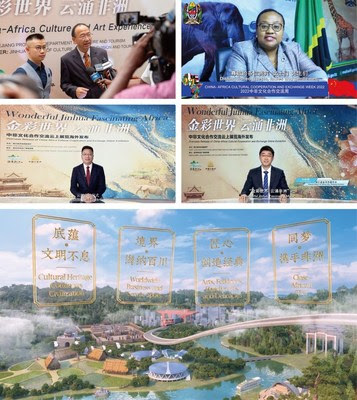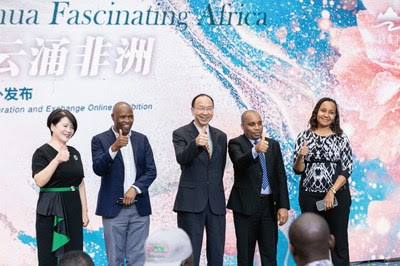At COP27, the United Nations climate change conference held in Egypt this month, China has figured prominently in a debate between Africa and Western nations over financial help to developing countries suffering the effects of climate change.
This year alone the African continent has seen deadly flooding in South Africa and the worst drought in years in the Horn of Africa.
African nations at COP27 are pushing hard for rich nations to pay climate compensation and contribute to a “loss and damage” fund.
In a joint statement, China, Brazil, India and South Africa accused rich nations of double standards for using fossil fuels while pushing developing countries to go green.
“The cold reality is that none of the high-income countries achieved ‘developed’ status under any carbon constraint, yet all the developing countries now need to find a new path to achieve high income [status] under the 1.5 degree target,” Wei Shen, a climate expert at Britain’s Institute of Development Studies, told VOA.
Ugandan President Yoweri Museveni posted on social media accusing the EU of “Western double standards,” pointing out that some European countries are going back to coal mining.
Since the war in Ukraine and without Russian gas, Germany has had to depend more on its own coal for energy to get through the winter.
Many African governments chafe at the fact that while the continent is responsible for about 3% of global emissions, they are being asked to phase out fossil fuels that some say are badly needed for development in a region where fewer than half the people have access to electricity.
Divisions over compensation
The U.S. has pushed for China — currently the world’s biggest greenhouse gas emitter and consumer of coal — to be included in the group of nations responsible for such reparations. As the world’s second-largest economy, China should be made to pay its share, Washington says.
But while China says it supports developing countries in their quest for funds, it will not be contributing cash because — according to World Bank criteria — it’s a developing country too.
“At COP27, China’s Climate Envoy Xie [Zhenhua] mentioned that China doesn’t have any obligation to provide L&D funding, but the country is willing to support lower-income countries for L&D caused by climate change,” Lei Alice Bian, a fellow at the London School of Economics, told VOA.”The U.S. attempt to position China as a developed country is really not going to fly in Africa because the African side accepts … that China should be treated as a developing country,” said Paul Nantulya, an analyst at the Africa Center for Strategic Studies in Washington.
That’s because the West is responsible for the “historical and cumulative” emissions from the industrial revolution that have caused the global warming that the world is experiencing today, he said.
While many developing nations blame the West for climate change, even saying China is also a victim, Ovigwe Eguegu, an analyst at Beijing-based consultancy Development Reimagined, told VOA: “It is widely accepted — even by Beijing — that China’s meteoric rise to world’s second-largest economy came at a cost to the environment.”
“China finds itself in a paradox,” Nantulya said.
“It’s the world’s largest emitter … however China has also emerged as the largest investor per capita in the world in clean energy.”
Green Silk Road
Chinese President Xi Jinping vowed at the U.N. last year that his country would no longer be financing new coal power abroad, with a focus instead on clean energy, although the road to green energy has some hurdles.
The Chinese-backed Special Economic Zone in Musina, South Africa, originally included a coal-fired power station.
“Initial plans to build a coal-fired power station have been put on hold. A 1000 MW solar plant is planned to supplement the energy mix requirements … with a Chinese investor,” Shavana Mushwana, a spokesperson for the zone, told VOA by email.
However, Patrick Bond, a political economist at the University of Johannesburg, said even without the new coal power plant, the development will be a polluter, noting “there’s a huge asterisk there … since the additional power required to run such vast smelters and industrial facilities can’t come from some small-scale solar installations,” so the Special Economic Zone will still need to tap into South Africa’s excessively stretched grid.
Still, the change is indicative of what some analysts say is China’s diversifying Belt and Road Initiative in Africa — away from a focus on large infrastructure projects such as ports and railways and toward investment in green energy like solar, wind and hydropower.Evidence of China’s “Green Silk Road” can be seen throughout the continent. In energy-strapped South Africa, a Chinese company has set up the De Aar wind farm in the Northern Cape. In Kenya, China funded a 15-megawatt solar power plant in Garissa, and in the Central African Republic, a Chinese-built solar plant completed this year provides about 30% of the capital city’s power.
“In September 2021, the Chinese president announced at the U.N. General Assembly that China was going to stop the investment into coal, into projects abroad, and they’re going to be investing a lot more into clean energy,” Tony Tiyou, CEO of the consultancy Renewables in Africa, told VOA. “They’ve actually followed up on that.”
Fifteen Chinese-backed coal projects have since been canceled, though others that were already in the construction stage are ongoing, Nantulya said.He added that China’s banks “were very quick to respond to the change in policy. Exim Bank, for instance, issued $425 million in green bonds that were earmarked for clean energy investment.”
China invested $380 billion in clean energy in 2021, more than any other country, and accounts for nearly half of the world’s renewable energy investments.
“China is serious in engaging Africa’s renewable energy market,” Wei said.
Accusations of hypocrisy
Analysts noted Beijing’s focus on green energy comes after numerous previous cases of projects in Africa in which environmentalists have accused Chinese companies of polluting the environment and damaging wildlife habitats with their mining operations and infrastructure projects.
Even currently, China is involved in a contentious crude oil pipeline project along with Uganda, Tanzania and a French company. That’s despite opposition from the European Union, which worries the pipeline will harm the climate and environment.
Uganda’s Museveni slammed the EU for trying to intervene. Museveni is among a number of African politicians who regularly rail against what they see as Western lecturing and hypocrisy on climate change, arguing use of fossil fuels is what made the West rich and caused the climate crisis.
Rich countries, however, are divided on climate compensation.
Source: Voice of America



 on 20 November. Together, these two powerhouses will bring 29 matches of the FIFA World Cup and the official FIFA World Cup Daily, by Hisense show, FOR FREE.
on 20 November. Together, these two powerhouses will bring 29 matches of the FIFA World Cup and the official FIFA World Cup Daily, by Hisense show, FOR FREE.